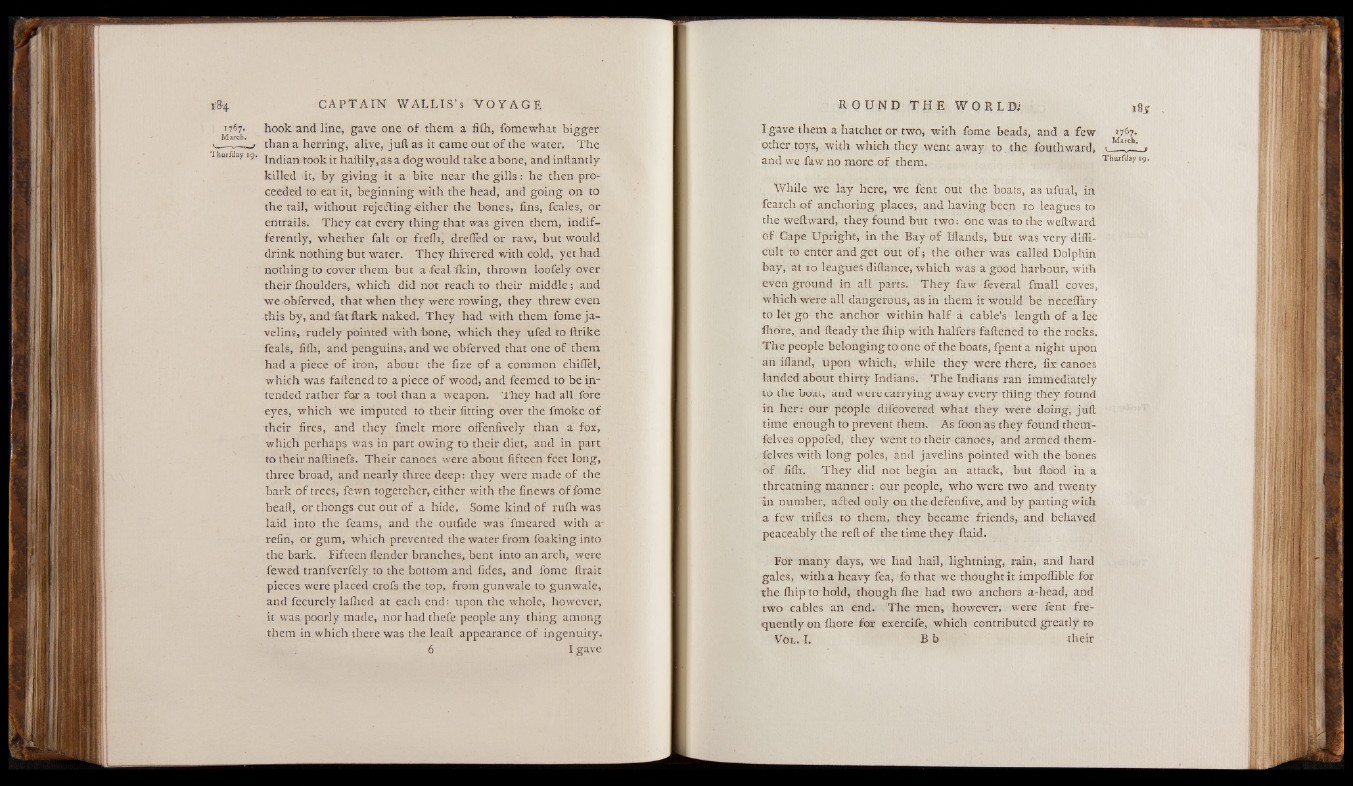
hook and line, gave one of them a fifh, fomewhat bigger
than a herring, alive, juft as it came out o f the water. The
Indian took it haftily, as a dog would take a bone, and inftantly
killed it , by giving i t a bite near the g ills : he then proceeded
to eat it, beginning with the head, and going on to
the tail, without rejecting either the bones, fins, fcales, or
entrails. They eat every thing that was given them, indifferently,
whether fait or frefh, drefled or raw, but would
drink nothing but water. They fhivered with cold, yet had
nothing to cover them but a feal fkin, thrown loofely over
their fhoulders, which did not reach to their middle; and
weobferved, that when they were rowing, they threw even
-this by, and fat ftark naked. They had with them feme javelins,
rudely pointed with bone, which they ufed to ftrike
feals, fifli, and penguins, and we obferved that one of them
had a piece o f iron, about the fize o f a common chiflel,
which was fattened to a piece o f wood, and feemed to be intended
rather for a tool than a weapon. They had all fore
eyes, which we imputed to their fitting over the fmoke o f
their fires, and they fmelt more offenfively than a fox,
which perhaps was in part owing to their diet, and in part
to their naftinefs. Their canoes were about fifteen feet long,
three broad, and nearly three deep: they were made o f the
bark o f trees, fewn togeteher, either with the finews of fome
beaft, or thongs cut out o f a hide. Some kind of rufh was
laid into the feams, and the outfide was fmeared with a-
refin, or gum, which prevented the water from foakinginto
the bark. Fifteen flender branches, bent into an arch, were
fewed tranfverfely to the bottom and fides, and fome ftrait
pieces were placed crofs the top, from gunwale to gunwale,
and fecurely lafhed at each end: upon the whole, however,
it was. poorly made, nor had thefe people any thing among
them in which there was the leaft appearance o f ingenuity.
6 I gave
I gave them a hatchet or two, with fome beads, and a few
other toys, with which they went away to the fouthward,
and we faw no more of them.
While we lay here, we fent out the boats, as ufual, in
fearch of anchoring places, and having been to leagues to
the weft ward, they found but two: one was to the weft ward
o f Cape Upright, in the Bay of Iflands, but was very difficult
to enter and get out o f; the other was called Dolphin
bay, at io leagues diftance, which was a good harbour, with
even ground in all parts. They faw feveral fmall coves,
which were all dangerous, as in them it would be neceflary
to let go the anchor within h a lf a cable’s length of a lee
fhore, and fteady the fhip with halfers fattened to the rocks.
The people belonging to one o f the boats, fpent a night upon
an ifland, upon which, while they were there, fix canoes
landed about thirty Indians. The Indians ran immediately
to the boat, and were carrying away every thing they found
in her: our people difcovered what they were doing, juft
time enough to prevent them. As foon as they found them-
felves oppofed, they went to their canoes, and armed them-
felves with long poles, and javelins pointed with the bones
o f fifli. They did not begin an attack, but flood in a
threatning manner: our people, who were two and twenty
in number, ailed only on the defenfive, and by parting with
a few trifles to them, they became friends, and behaved
peaceably the reft o f the time they ftaid.
For many days, we had hail, lightning, rain, and hard
gales, with a heavy fea, fothat we thought it impoffible for
the Ihip to hold, though fhe had two anchors a-head, and
two cables an end. The men, however, were fent frequently
on fhore for exercife, which contributed greatly to
Von. I, B b ' their